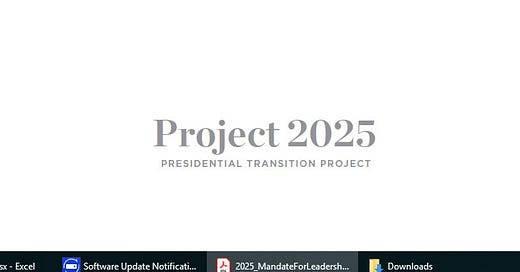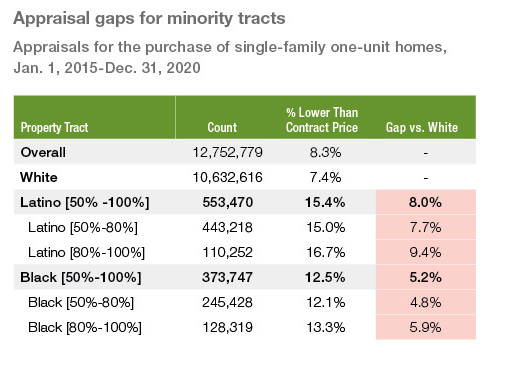The 2025 Mandate for Leadership, HUD's PAVE Initiatives, and the Transcendence of Ideology Over Fact
The 2025 Mandate for Leadership, HUD’s PAVE Initiatives, and the Transcendence of Ideology Over Fact
This past week curiosity got the best of me. I knew that the Heritage Foundation’s 2025 Mandate for Leadership: The Conservative Promise lays out some recommendations for action by various government agencies, and decided to learn more about what these might be.
In keeping with the stated aims of the Urban Lens, I renewed my resolve to remain as open-minded and impartial as possible. I have no loyalty to any political party. I find myself sometimes agreeing with positions and policies on both sides of the aisle, and sometimes disagreeing with both sides on some issues. When I found and started to read the 980-page document my objectives were to evaluate the fairness of the recommendations, to assess their alignment with generally-accepted “small d” democratic principles, and to consider how they might affect urban areas in particular.[1]
One of the first things that struck me was how heavily the document leans on political language. A shining example is the linguistic division of Americans into two opposing camps, the good guys (“us,” the “conservatives”) and the bad guys (“them,” the “liberals” and especially the “progressives”).
It quickly became clear that the “good guys” want to preserve their particular vision of American national traditions, decrease the size and influence of the “administrative state,” and restrict or eliminate recent initiatives that advance “woke” values. Woke values prominently include diversity, equity, and inclusion (DEI) and environmental, social, and governance (ESG) initiatives. The good guys are also keen on more assertively defending America’s sovereignty and interests against global threats like China.
The “bad guys” are portrayed as people who betray American values and traditions while seeking little or nothing more than to accumulate prestige, wealth and power. They are characterized as being self-aggrandizers who seek to transform the country by enlarging federal bureaucracy, enhancing centralized control, doing away with individual responsibility, and moving toward policies aimed at racial equity or climate change. The bad guys seem to pose an urgent and perhaps even existential threat to the future of the nation.
My reason for thinking this linguistic division must be political language is that it so obviously grossly oversimplifies the tremendous diversity of views found among the American public. It effectively maneuvers a wide range of views out of the discussion, leaving very little room remaining for factual analysis, or nuanced systems thinking. It can also wittingly or otherwise undermine if not completely stultify reasoned dissent, discussion and debate, democratic compromise, and efforts to cooperate across people and groups with different perspectives and circumstances.
My attention was naturally-enough drawn to the recommendations for the Department of Housing and Urban Development (HUD), and especially to the one to “Immediately end the Biden Administration’s Property Appraisal and Valuation Equity (PAVE) policies and reverse any Biden Administration actions that threaten to undermine the integrity of real estate appraisals.”
For readers who do not keep up with the goings-on in urban housing and real estate, the PAVE initiatives were designed and implemented to root out and remedy racial and ethnic bias in home valuations, whereby perceived race or ethnicity of homeowners influences the appraisal and valuation of their homes. This can result in the undervaluation of properties owned by individuals from certain racial or ethnic groups, and can contribute to disparities in home values and exacerbate broader issues of housing inequality.
To provide a factual basis from which to better understand what is going on with this “appraisal gap” recommendation, the following table is from a research report on data gathered from more than 12 million appraisals for purchase transactions submitted to Freddie Mac from January 1, 2015, to December 31, 2020.[2] It documents that Black and Latino tracts receive appraisal values substantially lower than the contract price more often than those in White tracts. In addition, as the concentration of Black or Latino in a census tract increases, this appraisal valuation gap increases.
From the perspective of systems theory, the appraisal gap documented in this table is the aggregate outcome of the interactions of numerous variables found throughout American society operating over time. These include historical practices of discrimination such as redlining, the implicit biases of appraisers, limited demographic diversity in the appraisal industry, stereotypes and market perceptions, a lack of recent and relevant comparable sales data in some neighborhoods, pressure from lenders and clients, and a dearth of legislative measures, regulatory frameworks, and proactive efforts by governmental bodies to promote fairness, transparency, and equality in the real estate industry.
From the perspective of the lived experiences of the Latino and Black homeowners whose homes get under-evaluated, the appraisal gap presents itself not in terms of data but rather in terms of restricted access to credit and financing options, lowered potential to acquire home equity and, in turn, artificially-imposed limits on options to accumulate wealth through homeownership. More than a few such homeowners would undoubtedly claim that this is but one member of a much larger set of social injustices found throughout American societal systems.
So, given that the appraisal gap is documented, precludes equal opportunity for some people, and that the PAVE initiatives were put in place to help remedy this problem, why would anyone recommend immediately getting rid of the PAVE initiatives? According to the 2025 Mandate for Leadership, the purpose of ending these initiatives is to remedy the “Biden Administration’s persistent implementation of corrosive progressive ideologies across the department’s programs.”
Really? Is the chief problem here one of ideology rather than of biased appraisals? And does exclusively ideologically-driven state action ever lead to social renewal?
Several examples of state action in which ideology clearly transcended fact come to mind. These include the "War on Drugs," trickle-down economics, abstinence-only sex education, climate change denial, and opposition to the Affordable Care Act (Obamacare). And to reach only a little further back in time, Marxism-Leninism and National Socialism were both ideologically-driven solutions to the perceived problems of the twentieth century.
Indeed, if these examples are at all representative, ideologically-driven state action does not solve problems as much as it undermines self-determination and contributes to the decline of reason. And in the extreme, it savages and tramples humanity.
Which begs two questions. First, how (if at all) do advocates of the 2025 Mandate for Leadership regard the effect of the appraisal gap on the lived experience of injustice faced by the people who own the under-valuated homes? Second, how widely spread throughout the 920 pages of the document can one find the sort of transcendence of ideology over fact?
In respect to the first question, it seems safe to assume that the intention of the advocates of ending PAVE is not to perpetuate the bias itself. But given that we know from systems thinking that the appraisal gap was produced over time by the interactions of many variables, such as those I mentioned a minute ago, to put a sudden end to any remedial state action would most likely have the effect of perpetuating it, regardless of intention. One wonders how these advocates might reconcile the effect of ending the PAVE initiatives with the American aspiration of “liberty and justice for all” spoken by all who recite the Pledge of Allegiance.
Which gets to the second question. It’s practically impossible to determine how carefully any of the authors of the 2025 Mandate for Leadership have done robust, factually driven research on the potential unintended consequences of the actions they recommended. But if the recommendation about the PAVE initiatives is any indicator, then the answer is evidently somewhere between very little and none.
Past this, when state action is justified primarily or only on the basis of political language and ideology, rather than in conjunction with robust, evidence-based reasoning, unintended and potentially serious negative consequences are far more likely to occur. The appraisal gap is an example.
Bill Bowen
[1] I focused upon the introductory parts, and the section on the US Department of Housing and Urban Development (HUD), since it most obviously stands to affect urban areas. The entire document can be downloaded for free at https://www.project2025.org/policy/ .
[2] https://www.freddiemac.com/research/insight/20210920-home-appraisals





